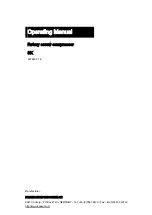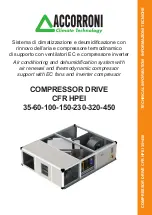
15
English
equipment: ANSI Z87.1 eye protection (CAN/CSA Z94.3) with side
shields when using the compressor.
Before starting compressor, pull the ring on the safety valve to
make sure that the safety valve operates freely. If the valve is stuck
or does not operate smoothly, it must be replaced with the same
type of valve.
Checking Air Filter Element (Fig. 1)
WARNING
: Hot surfaces. Risk of burn. pump head, and
surrounding parts are very hot, do not touch (see the Hot Surfaces
identified in Fig. 2). Allow compressor to cool prior to servicing.
1. Ensure engine ON/OFF switch (C) is in the OFF position.
2. Allow unit to cool.
5. Remove filter (A).
6. If filter needs cleaning, blow out with air. Replace
A
if needed. Purchase replacement parts from
your local dealer or authorized service center.
Always use identical replacement parts.
7. Place filter back in filter base.
NOTICE:
Risk of unsafe operation. Do not operate without air
inlet filter.
Draining Air Tank (Fig. 1)
WARNING:
Risk of unsafe operation. Air tanks contain high
pressure air. Keep face and other body parts away from outlet
of drain. Use eye protection [ANSI Z87.1 (CAN/CSA Z94.3)] when
draining as debris can be kicked up into face.
WARNING:
Risk from noise. Use ear protection (ANSI S12.6
(S3.19) as air flow noise is loud when draining.
NOTE: All compressed air systems generate condensation that accu-
mulates in any drain point (e.g., tanks, filter, aftercoolers, dryers). This
condensate contains lubricating oil and/or substances which may be
regulated and must be disposed of in accordance with local, state,
and federal laws and regulations.
1. Ensure engine ON/OFF switch (C) is in the OFF position.
2. Turn the regulator counterclockwise to set the outlet pressure to
zero.
3. Remove the air tool or accessory.
4. Pull ring on safety valve allowing air to bleed from the tank until
tank pressure is approximately 20 psi. Release safety valve ring.
5. Drain water from air tank by opening drain valve (counterclock-
wise) on bottom of tank.
WARNING:
Risk of bursting. Water will condense in the air
tank. If not drained, water will corrode and weaken the air tank
causing a risk of air tank rupture.
NOTICE:
Risk of property damage. Drain water from air tank may
contain oil and rust which can cause stains.
6. After the water has been drained, close the drain valve (clock-
wise). The air compressor can now be stored.
NOTE:
If drain valve is plugged, release all air pressure. The valve
can then be removed, cleaned, then reinstalled.
NOTE:
Tilt unit to drain tanks (B).
NOTE:
In cold climates, drain the tanks after each use to
reduce problems with freezing of water condensation.
Summary of Contents for DXCMTA5090412
Page 70: ...70 Español NOTES ...
Page 71: ...71 Español NOTES ...
















































